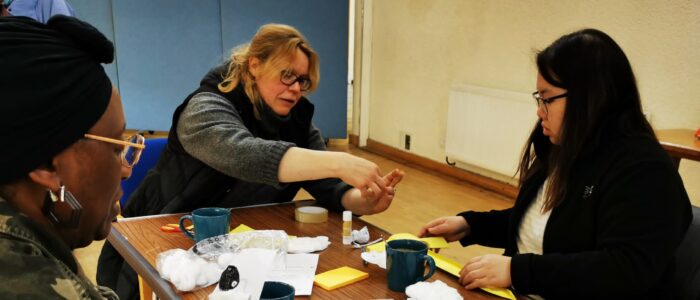Don’t Pitchfork Tragedy

Recently I found myself in a radio studio recording a news commentary programme. There were a number of interesting things to discuss and to wrestle with regarding how the issues raised reflected on faith and what faith communities might want to do in response, or in reaction. I suppose it is this position of reaction which concerns me. Sometimes our responses can be ‘knee-jerk’ and ill thought out, but sometimes they are considered and measured. Either way they are reactive not proactive. It can be exciting and stirring to respond to fast moving circumstances. However, there is a sense of not being in control of our own destiny. In fact I question whether, if those who have authority are seen constantly just to be responding to the mind and issues of the day, they are leaders at all. I feel there must be more credit given to those who have vision beyond the horizon, those who see the sunny uplands in the distance, not just the tempests we seem to lurch between. Often this means swimming against the tide of populism, but also against the interest and attention of the public, media etc.
 The week I was in the studio was just after the tragic killing of the school teacher Ann Maguire. Having recently served on a jury I wanted to be very careful not to focus on this particular case and the student who is accused of this terrible crime. I found myself considering the incident in connection with those which seem to take place so often in America (the last teacher to be killed in the classroom in the UK was a victim of the Dunblane massacre in 1996). We all wonder what can bring a pupil to do this to a teacher in cold blood. I don’t want to see this just as a wild and out of the ordinary event that has no connection with me and my life. I don’t want to ‘pitch fork’ this tragedy – to just throw it over my shoulder and carry on. The common thread seems to be the unexpected nature of the incidents and the unassuming nature of the individuals who do it: often under-spoken and isolated, and far too frequently someone who has experienced ‘low level’ but constant bullying.
The week I was in the studio was just after the tragic killing of the school teacher Ann Maguire. Having recently served on a jury I wanted to be very careful not to focus on this particular case and the student who is accused of this terrible crime. I found myself considering the incident in connection with those which seem to take place so often in America (the last teacher to be killed in the classroom in the UK was a victim of the Dunblane massacre in 1996). We all wonder what can bring a pupil to do this to a teacher in cold blood. I don’t want to see this just as a wild and out of the ordinary event that has no connection with me and my life. I don’t want to ‘pitch fork’ this tragedy – to just throw it over my shoulder and carry on. The common thread seems to be the unexpected nature of the incidents and the unassuming nature of the individuals who do it: often under-spoken and isolated, and far too frequently someone who has experienced ‘low level’ but constant bullying.
This is surely where the role of community based groups such as faith communities can kick in. It is in the area of prevention, not reaction. I am not talking of the prevention of tragedy, but instead the prevention of isolation, loneliness and disassociation which seems to be at the heart of the problem. This in turn leads isolated individuals to a kind of fantasy existence and the idiosyncratic approval of the internet community and life in cyber world.
 Faith communities can be on the front line (and often are!) in dealing with isolation and giving meaningful opportunities for socialisation. In a small way the Friendly Places pledge reinforces, encourages and highlights aspects of the work of faith communities. Why not sign up to the pledge today? And if you want support to help your community or organisation, let us know as we will be running a series of workshops on Friendly Places in the next couple of months. Contact [email protected]
Faith communities can be on the front line (and often are!) in dealing with isolation and giving meaningful opportunities for socialisation. In a small way the Friendly Places pledge reinforces, encourages and highlights aspects of the work of faith communities. Why not sign up to the pledge today? And if you want support to help your community or organisation, let us know as we will be running a series of workshops on Friendly Places in the next couple of months. Contact [email protected]
If you want to see what a variety of organisations are doing in this area, check out the resources and programmes on the health portal and specifically the pages on mental health.



